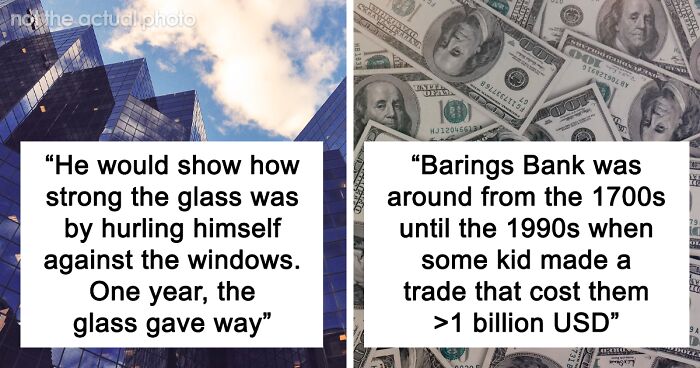
35 Worst Decisions Made By Large Companies That Nearly, Or Did, Shut Them Down
Interview With ExpertLeaving your mark on the business world is no easy feat. As an entrepreneur, you have to have a clear vision and proper values. Meanwhile, you have to make a profit while also ensuring that you leave behind a legacy you can be proud of!
However, business owners aren’t infallible. Strategic mistakes can and do happen. Some of them can radically alter the course of the company’s future… for the worse. The r/AskReddit online community shared some of the most well-known examples of companies getting wrecked because of a single miscalculation. You’ll find their stories as you scroll down.
Bored Panda wanted to learn about how business leaders can make good strategic decisions and what common mistakes they ought to avoid, so we got in touch with Matt Johnson, Ph.D., a marketing psychology speaker and the host of the branding and human nature blogs. Johnson shed some light on the topic and you'll find his expert insights below.
This post may include affiliate links.
Sears hired an Ayn Rand loving ultra-capitalist that hated the idea of a planned economy so much that he made the internal departments at Sears compete with each other, and it completely destroyed the company. Let me say that again: He made different departments of the same company compete with each other and it DESTROYED a 120 year old company. His name is Eddie Lampert, he also destroyed K-Mart, and he is studied for just how stupid of a CEO he is. Everyone should read about him
We asked marketing psychology speaker Johnson about how business leaders can be more confident that their decisions will benefit, rather than harm, their companies. "Business leaders can enhance their confidence in strategic decision-making by employing robust frameworks and exercises that prioritize thorough analysis and risk mitigation," the host of the branding and human nature blogs explained to Bored Panda via email.
According to the expert, the classic framework for this in business leadership is SWOT, which stands for strengths, weaknesses, opportunities, and threats. Leaders can use this analysis to "plot out their plans" and "assess internal capabilities and external market dynamics." This should then allow them to make informed decisions that are not only aligned with the company's strengths and opportunities but also mitigate weaknesses, as well as potential threats.
"This can be a good start and can help the decision-maker unearth some worthwhile information. At the same time, it’s frankly a bit outdated," Johnson pointed out to Bored Panda that there are newer, more effective ways to approach this question.
The venerable Encyclopedia Britannica had ample warning that the world was going digital, but they didn’t want to cannibalise sales of the print encyclopedia, so when they finally and reluctantly offered the encyclopedia on CDs, they charged $1500 for it and made the brilliant decision to make it text-only. I worked with the guy who made that decision. Everyone hated him.
We have a lovely full late 1970s set, partly for decoration, partly nostalgia, but they often get grabbed as a starting point for a school project, for example.
One of these is scenario planning. It "allows leaders to anticipate various future scenarios and devise strategies to navigate each, thereby reducing the impact of unforeseen events. Unlike SWOT, this helps business leaders develop strategies that are robust concerning market conditions and unforeseen events."
"By integrating these frameworks and exercises into their strategic planning processes, business leaders can optimize their decision-making and increase confidence that their choices will benefit their companies in the long run," Johnson said.
Meanwhile, the marketing psychology speaker shared a few key insights into the common mistakes that new business owners might make. "Starting a new business of any kind has a very slim success rate. Some of these failures aren’t the fault of decision-making, per se, but instead, reflect unforeseen, unavoidable changes in the market. However, new business owners do fall into several common mistakes," Johnson, the host of the branding and human nature blogs, told Bored Panda.
Pyrex letting whoever wants to slap their name on something as long as it is lowercase pyrex do so seems to have tanked the business hard. Basically made their brand unreliable because the lowercase p stuff is usually not heat resistant like uppercase P stuff is.
They claim it was for safety reasons that they changed their unique glass that was the only one on the market with such a high heat resistance to the same glass everyone else is using for cookware. The old pyrex glass only breaks if it drops and under very extreme, sudden heat changes. But it has very sharp edges. Well, it's broken glass, duh. Who cares? The new glass breaks easily and has lost a lot of usability, because it already breaks when you take it out of the oven and put it on a colder surface. But then the edges are not sharp. So they traded a loss in general usability for mor comfort when you throw it away. And now they wonder why Pyrex loses so many sales and refuse to switch back to the old standard. Now they wonder why no one is willing to pay a pyrex price for stuff of the same quality as half priced items. How can anyone be so stupid.
 Rubbermaid. Walmart made them lower their prices so much they went bankrupt. Someone bought the trademark. I believe Walmart is the reason lots of smaller companies went under in the late 90's early 2000's.
Rubbermaid. Walmart made them lower their prices so much they went bankrupt. Someone bought the trademark. I believe Walmart is the reason lots of smaller companies went under in the late 90's early 2000's.
 Circuit City when they decided to fire 3400 seasoned employees and replace them with high school kids (who will work for less) thinking it was a smart business move.
Circuit City when they decided to fire 3400 seasoned employees and replace them with high school kids (who will work for less) thinking it was a smart business move.
"One of the most common is their misunderstanding of how their product is actually valued by the market. Many business owners think that, because they value the product, consumers should too. They fail to realize that a product is only valuable if it is perceived as such by the market; it can’t be unilaterally dictated by the business. Overall then, the common mistake here is underestimating the importance of market research and failing to understand the target audience's actual needs and preferences. This oversight can lead to products or services that don't resonate with customers, hindering the business's growth," he said.
"Along similar lines, business owners also struggle to assimilate the signals they're getting from the market and to use that to make adjustments to their product itself. When a product fails to resonate, the common approach that business owners take is to change how their brand looks, or their approach to marketing the product, instead of doing the hard, necessary thing of actually changing the product."
 Netscape is a great example of why you don't just rewrite software from scratch. Was the most popular web browser and they decided the code was ugly and messy so they should rewrite it. After the rewrite, they realized the reason it was so ugly and messy before was because of all the bug fixes. The new release was buggy and the rest is history, now hardly anyone even remembers the name.
I bring this up every time a software engineer wants to rewrite from scratch, because as ugly as code can be, it is usually on account of all the issues that have been fixed along the way.
Netscape is a great example of why you don't just rewrite software from scratch. Was the most popular web browser and they decided the code was ugly and messy so they should rewrite it. After the rewrite, they realized the reason it was so ugly and messy before was because of all the bug fixes. The new release was buggy and the rest is history, now hardly anyone even remembers the name.
I bring this up every time a software engineer wants to rewrite from scratch, because as ugly as code can be, it is usually on account of all the issues that have been fixed along the way.
When Photobucket decided to take the whole internet hostage by asking for 400$ a year for what was previously a free image storage solution. The move broke years of forums posting and erased a significant portion of the web collective knowledge.
As of 2022, the collective size of the internet was estimated to be 1,000,000,000,000 gigabytes, or 1 billion terabytes. If every single server that hosts that collective storage was populated exclusively by 20 terabyte drives, there would be 50 million of them, which works out to 5,555,555 million 2u, 9 drive racks...just for the drives....which would work out to around 100,000 kilowatts of energy consumption....just to keep those disks spinning, which is a fraction of the overall total consumption of the server farms. But of course the number of drives it takes to populate the internet is much higher, as are the energy costs. Services are "free" only because YOU are the product, they want to sell your data. That's the whole game. When that stops being financially or socially acceptable....then you have to pay.
 I have to think about Toys R Us. They outsourced their online store to Amazon, who turned into their competitor.
I have to think about Toys R Us. They outsourced their online store to Amazon, who turned into their competitor.
Data backs up the idea that going into business for yourself can be risky if you don’t know what you’re doing. The Bureau of Labor Statistics reports that, in the United States, around a fifth of new businesses fail in the very first 2 years of being open.
Meanwhile, 45% of all businesses fail in the first 5 years and 65% fail in their first decade. Fast forward a bit and you’ll find that only a quarter of American companies survive 15+ years.
Borders Books - I was in the meeting when they decided the way to solve their terrible online sales was to outsource it to Amazon. They were gone inside of 30 months.
Amazon started as an online bookseller..........so they knowingly handed their online sales to a competitor?
 Radio Shack trying to compete with Best Buy in bigger ticket consumer electronics rather than sticking to what they did best. I worked there in the early/mid 00s and you could feel the downfall as it was happening.
Radio Shack trying to compete with Best Buy in bigger ticket consumer electronics rather than sticking to what they did best. I worked there in the early/mid 00s and you could feel the downfall as it was happening.
I miss going in searching for diodes and switches that I needed for projects and then Fry's Electronics (Disneyland for geeks) went under and closed leaving us wandering in a barren wasteland and no, Amazon isn't the same thing.
 Holden Day. Law firm in Toronto. Every year, one of the partners would show the new articling students how strong the exterior glass was on their office tower by hurling himself against the floor to ceiling windows in a boardroom. It was a stunt that he thought would break the ice or something. One year, the glass gave way and he fell 30 storeys to his death. The firm never recovered, and wound down shortly after that.
Holden Day. Law firm in Toronto. Every year, one of the partners would show the new articling students how strong the exterior glass was on their office tower by hurling himself against the floor to ceiling windows in a boardroom. It was a stunt that he thought would break the ice or something. One year, the glass gave way and he fell 30 storeys to his death. The firm never recovered, and wound down shortly after that.
The glass didn't 'give way', the frame came out of the wall, glass still intact !
According to Investopedia, these findings have been consistent since the 1990s. So, out of the 843,320 new businesses that were started in the US between March 2020 and March 2021, it can be expected that around 168,664 will have failed within the first 2 years of operating.
However, good entrepreneurs will be able to avoid these disasters and become just another statistic. But it takes consistent planning, lots of flexibility, and good money and people managing skills. In short, you need a business-savvy leader with a good head on their shoulders and a trustworthy intuition at the helm of the ship.
Bethlehem Steel..CEO threw lavish parties from workers’ pensions. That was the beginning of the end for a once great company. My grandfather was one of many hardworking steel workers that lost his pension due to a bad CEO and a board that didn’t care. Seeing the cement hq being taken down in one glorious implosion was a true sight after it stood like the tower of Sauron in the middle of a forest for decades
I don’t understand how someone could work their whole life and loose a pension. This should come out of the CEO pockets.
 Hoover UK offering two free flights to the US (worth £600) to anyone buying £100 of Hoover products in 1992. They were relying on people spending a lot more than the minimum and a tedious application process putting off most people. Customers just saw it as £100 flights to the US with a free vacuum cleaner. They tried to re-neg on the deal but were forced to carry on under the threat of lawsuits. It crippled the company financially, they never recovered and were eventually sold off to a competitor.
Hoover UK offering two free flights to the US (worth £600) to anyone buying £100 of Hoover products in 1992. They were relying on people spending a lot more than the minimum and a tedious application process putting off most people. Customers just saw it as £100 flights to the US with a free vacuum cleaner. They tried to re-neg on the deal but were forced to carry on under the threat of lawsuits. It crippled the company financially, they never recovered and were eventually sold off to a competitor.
 A radio station i used to listen to recently changed their format from 80% music, 20% talk show to 100% talk show. Then they were like “oh you can still listen to the music but it’s only going to be on our app.”
A radio station i used to listen to recently changed their format from 80% music, 20% talk show to 100% talk show. Then they were like “oh you can still listen to the music but it’s only going to be on our app.”
iHeartRadio has killed local radio stations. I'm from Cleveland, the literal home of the Rock & Roll Hall of Fame... and we now have exactly zero rock radio stations. The only options are one that refuses to play anything made after 1980 or another that is talk shows from 6am to 12am.
Forbes notes that a lack of short and long-term planning can ‘kill’ a business. Entrepreneurs must have a business plan for the next few months and years, including specific deadlines for measurable goals. While plans often change because you can’t account for everything in advance, the more clarity you have, the better off you’ll be.
Knowing what direction you’re taking your business in is far better than doing whatever and praying for good luck. You have to be meticulous when running your company, including taking the time to research the market and your potential competitors. But you also have to find a balance between delegating decisions to your trusted staff and keeping an eye on the day-to-day operations without becoming a micromanager.
 Sears refused to expand into e-commerce despite them fully having the capacity to do so in the early 2000s. Same could also be said of Blockbuster and their refusal to embrace streaming video.
Sears refused to expand into e-commerce despite them fully having the capacity to do so in the early 2000s. Same could also be said of Blockbuster and their refusal to embrace streaming video.
Found my old Blockbuster card in a drawer the other day. Maybe I should head for Bend Oregon where the last store is to see if they'll honor it?
 Schlitz beer once tried to increase their bottom line by using cheaper ingredients.
Result: poorer quality (including a slimy mucus at the bottom of the bottles), which in turn caused sales to drop hard. They reversed back to the old ingredients, but the customer base never trusted them again, and Schlitz died off.
Schlitz beer once tried to increase their bottom line by using cheaper ingredients.
Result: poorer quality (including a slimy mucus at the bottom of the bottles), which in turn caused sales to drop hard. They reversed back to the old ingredients, but the customer base never trusted them again, and Schlitz died off.
Another big part of entrepreneurship is balancing the vision you have in your mind for your brand with the reality of the market. If you’re doing exactly what your competitors are doing, you might not be able to stand out from the crowd, making you just another bland copycat.
On the flip side, if you’re unwilling to make any adjustments or compromises to your grand vision, you might run the company into the ground because things aren’t going as ‘perfectly’ as you’d hoped. Rigidity in the face of major market and trend shifts can sink your ship faster than you can spell ‘bankruptcy.’
 Smile Direct Club was pretty recent. Essentially from my understanding, an employee accidentally received an email of all the salaries in the company who then decided to forward it to the rest of the company. A lot of people realized they were getting underpaid and screwed over and essentially mutinied and quit.
A lot of shady stuff started to get leaked as well and lawsuits were just piling up. They didn’t have enough workers to meet demand to overcome expenses and they just shut down a few weeks ago.
Smile Direct Club was pretty recent. Essentially from my understanding, an employee accidentally received an email of all the salaries in the company who then decided to forward it to the rest of the company. A lot of people realized they were getting underpaid and screwed over and essentially mutinied and quit.
A lot of shady stuff started to get leaked as well and lawsuits were just piling up. They didn’t have enough workers to meet demand to overcome expenses and they just shut down a few weeks ago.
Accidentally or "accidentally"? I've heard of this sort of thing done by a disgruntled employee on their way out of the door.
 Park City Mountain resort lost their hundred year lease because somebody forgot to send in the payment check, thus allowing Vail resorts to come in and buy it and take over. That kind of f****d the whole Park City community.
Park City Mountain resort lost their hundred year lease because somebody forgot to send in the payment check, thus allowing Vail resorts to come in and buy it and take over. That kind of f****d the whole Park City community.
 Vine.
Vine was the Tik Tok of its day and then Twitter bought it and decided there was no profit in it.
Vine.
Vine was the Tik Tok of its day and then Twitter bought it and decided there was no profit in it.
Aside from being flexible, you also have to understand the virtue of patience. Many people want to get rich as quickly as possible. However, this opens them up to impulsive and rash decisions. It’s important to strike when you sense an opportunity, sure. But at the same time, you have to consider what might happen if you’re wrong about your gut instinct. Expanding too fast or drastically altering the philosophy of your brand are very risky decisions.
For some more insights into bad business decisions to avoid at all costs, check out Bored Panda's earlier articles.
 Not shut down but special consideration should be given to Xerox.
They are the originators of both the mouse and the GUI interface every PC has been based on for almost 30 years. Both Jobs and Gates stole this technology.
Not shut down but special consideration should be given to Xerox.
They are the originators of both the mouse and the GUI interface every PC has been based on for almost 30 years. Both Jobs and Gates stole this technology.
Quiznos over franchised their stores and screwed over their own franchisees.
KMart for investing in more real estate instead of store and technology upgrades. Still admire the slow burn nationwide closures. I’ve never seen a corporation drag it out for that long.
 Yellow trucking bought out a bunch of smaller companies, and never bothered to consolidate them into a single entity (each one would operate independently as a subsidiary). Not only did this force them to take on loads of debt, but it also put them at odds with the Teamsters, who had active agreements with each company prior to the buyouts.
They never recovered from this move, and relied heavily on the Teamsters to negotiate pay/benefit cuts for its members for the next decade and a half. When the union rejected the latest concession proposal earlier this year, the company shut down and blamed the union for it's own incompetence.
Yellow trucking bought out a bunch of smaller companies, and never bothered to consolidate them into a single entity (each one would operate independently as a subsidiary). Not only did this force them to take on loads of debt, but it also put them at odds with the Teamsters, who had active agreements with each company prior to the buyouts.
They never recovered from this move, and relied heavily on the Teamsters to negotiate pay/benefit cuts for its members for the next decade and a half. When the union rejected the latest concession proposal earlier this year, the company shut down and blamed the union for it's own incompetence.
Yet more evidence that when you declare war on your workers, they will survive, you will not. I worked for a tier one auto supplier, formerly Chrysler, who decided they didn't want to make parts, just buy them. Sell to Textron, who were no dummies due to pension and retiree benefits(legacy costs), and looming economic contraction, sell to Collins and Aikman, who leveraged the c**p out of the purchase. recession comes...BOOM.. gone. Hurt a lot of people.
Canadians will remember this one Eaton’s. They were such a great place to shop and their catalogue was great. They connected people in very rural areas with the same merchandise they could get in the cities. They had such gorgeous stores that were well stocked and well staffed. You can still see the Eaton’s letter outlines on the former store here. Poor management cost a once great company. I’m sure Timothy Eaton is still spinning in his grave. I miss that company a lot.
The catalogues were terrific! My first job was with them as their "Major Appliance Service and Repair Rep." We still used teletype to communicate with other stores. They psid well.
 Blitz USA Inc - they made gas cans, car ramps, that sort of thing. They refused to add a simple screen to their gas cans that would prevent flash over, even after multiple lawsuits. Even after not being able to use their own fuel containers on their own production floors due to OSHA regs. Now they don't exist. It's almost a case of corporate suicide.
Blitz USA Inc - they made gas cans, car ramps, that sort of thing. They refused to add a simple screen to their gas cans that would prevent flash over, even after multiple lawsuits. Even after not being able to use their own fuel containers on their own production floors due to OSHA regs. Now they don't exist. It's almost a case of corporate suicide.
I used to work for one of the biggest book distributors in the United States, called Pacific Pipeline. They decided to have our computer systems for the entire operation, redone right before the Christmas season. The system was full of flaws and messed up so many orders, which lost of tons of business. The bad decision was to let the people who installed the system, try to fix what they did, before trying to sue them. They never fixed it, and that was the end of that. Probably should have hired another company to do it when they failed originally. Or better yet, wait until after the holiday rush was over.
Never do anything on a fully working system, at least not before big sale time!
 Sun Microsystems not embracing Linux until it was too late.
I worked there at the time, and Linux was seen as kind of a toy operating system with little margin. Just cheap small boxes.
Well, it turned out, cheap small boxes are now what runs in datacenters and Linux is everywhere.
Sun was making money hand over fist selling really high margin servers - and knew it would cannibalize its own sales. And since no exec was willing to sacrifice their own revenue (and bonuses) to help for a future where they may not be there (lots of Sun Execs /VPs left for more lucrative positions), it was a tough sell.
I know it was tough to disrupt the server business. I worked on the software side, and they would include our software to boost hardware sales (when in reality, every other company in the world viewed hardware as a commodity and software as the value add).
Sun Microsystems not embracing Linux until it was too late.
I worked there at the time, and Linux was seen as kind of a toy operating system with little margin. Just cheap small boxes.
Well, it turned out, cheap small boxes are now what runs in datacenters and Linux is everywhere.
Sun was making money hand over fist selling really high margin servers - and knew it would cannibalize its own sales. And since no exec was willing to sacrifice their own revenue (and bonuses) to help for a future where they may not be there (lots of Sun Execs /VPs left for more lucrative positions), it was a tough sell.
I know it was tough to disrupt the server business. I worked on the software side, and they would include our software to boost hardware sales (when in reality, every other company in the world viewed hardware as a commodity and software as the value add).
I also worked for Sun ... Linux had zero enterprise level support until Redhat went public. Most corporations could not adapt because there was no support. I built Medicare.com on Linux and Netscape Enterprise against the wishes of everyone in1998.
Once upon a time I worked at a Barkers department store. It was a lower mid level discount store chain a'la Kmart, occupying the mid-Atlantic states. They went under in the mid 80's or so, but in 1978 I could read the writing on the wall. I think they failed to catch the bus in not adopting some sort of scanning technology when everyone else was going there. They used a 9 digit inventory control system, compartmented by department number. This meant front cashiers had to punch in ELEVEN numbers before the price. This was an extraordinarily SLOW checkout process. I can remember standing at the register, fingers flying, sweating bullets with a line going back into the store with impatient people. I was one of the fastest on the register line. Ticked off customers along with the common mistakes of mis- entered (or purposeful mis-entering for speed) inventory numbers I'm sure had great deal to do with Barkers demise .
This article reminds me of fuckedcompany.com, a wildly successful site back in the day. Drew something or other from Southern California. Got ran off the internet by money, corporations, governments, law suits or extortion - nobody really knows. I knew him.
 Barings Bank was around from the 1700s until the 1990s when some kid in Singapore made a trade that cost them >1 billion USD. I think that's my best example that comes to mind.
Barings Bank was around from the 1700s until the 1990s when some kid in Singapore made a trade that cost them >1 billion USD. I think that's my best example that comes to mind.
Someone in IT decided to deploy untested software. Knight Capital Group loses $445 million in 45 minutes. Knight Capital Group had to sell itself to another firm at a discounted price, and several of its top executives were fired
This wasn't just a dude being dumb. They made/had significant technology errors that caused the problem. The issue did start with a tech failing to include updated code before publishing to production, but he shouldn't have been able to do that without change control and they left a function in their code that was "depreciated" but still fully functional. It's wild for sure, but don't blame the homie for messing up a copy pasta.
MySpace… whatever they did with the servers that had all our old profiles, pics, and chats.
I still have a MySpace account, but have no idea what my password was, or the password for the AOL email account I set it up with.
Not quite dead, but Miku released a bad firmware for their baby monitor which destroyed the onboard storage. They did the right thing and replaced all monitors out in the market, but then went bankrupt and recently got purchased and brought back to life with nearly every feature that used to be free now behind a paywall. I wonder how the QA/Engineer(s) working on that product feel about missing that bug...
Wework
I read this as "werework". I was trying to figure out what work might be furry.
A German company named Schwarzkopf invented a haircare line named Schauma. They were Germanies leading haircare line for decades. Almost everyone used it, everyone knew it. It was the No. One top seller on the market. Until 2006 that is. In 2007, the powers that be decided that the brand needed a rebranding. The bottles were deemed too old-fashioned and their marketing department decided to completely redesign the unique tear shaped bottle form of Germany's markt leading brand to one that was more align with 'modern designs' and more 'compact'. After that the bottles looked like every other bottle on the shelves. Guess what? The sales plummeted. Consumers just couldn't find their favourite products on the shelves. Also, Schauma shampoo had been one of the cheapest. 'Coincidentally' the new bottles were smaller while the price was slightly raised. People then switched to other products because honestly? There were definitely better products on the market. The company didn't go under.
It had been bought up by Henkel, a bigger company in 1995 and they could bridge the loss, but even when they switched back, it was too late. The brand had lost its lead. Now it's again profitable, but what was once a leading product everyone bought and trusted, lost its good standing and perfect mouth to mouth recommendation and has now to compete against all the other players that used the chances to seize the market. It has never been able to regain its former popularity and has never again been in any lead position. I call that very stupid
Load More Replies...I'm surprised no one mentioned Bud Light. It didn't take the company down, but it sure took a hit.
At the moment, I would add BoredPanda to this list. Yes, it’s not a huge company, it it had a lot of subscribers around the world. What is with all the adverts? And those silly pop ups when you scroll down the page. Then add in the hilariously over the top censoring, which assumes we are all 8 years old. Then, what’s with the stories regarding shopping? Why are you trying to be like Buzzfeed? They’re s**t and already there, so why are you imitating them?
And the text paragraphs in between the images/posts harvested from other sites-- that used to actually contribute something to the experience; now it's usually AI generated garbage that, often, is barely even related to what the listicle is about.
Load More Replies...A German company named Schwarzkopf invented a haircare line named Schauma. They were Germanies leading haircare line for decades. Almost everyone used it, everyone knew it. It was the No. One top seller on the market. Until 2006 that is. In 2007, the powers that be decided that the brand needed a rebranding. The bottles were deemed too old-fashioned and their marketing department decided to completely redesign the unique tear shaped bottle form of Germany's markt leading brand to one that was more align with 'modern designs' and more 'compact'. After that the bottles looked like every other bottle on the shelves. Guess what? The sales plummeted. Consumers just couldn't find their favourite products on the shelves. Also, Schauma shampoo had been one of the cheapest. 'Coincidentally' the new bottles were smaller while the price was slightly raised. People then switched to other products because honestly? There were definitely better products on the market. The company didn't go under.
It had been bought up by Henkel, a bigger company in 1995 and they could bridge the loss, but even when they switched back, it was too late. The brand had lost its lead. Now it's again profitable, but what was once a leading product everyone bought and trusted, lost its good standing and perfect mouth to mouth recommendation and has now to compete against all the other players that used the chances to seize the market. It has never been able to regain its former popularity and has never again been in any lead position. I call that very stupid
Load More Replies...I'm surprised no one mentioned Bud Light. It didn't take the company down, but it sure took a hit.
At the moment, I would add BoredPanda to this list. Yes, it’s not a huge company, it it had a lot of subscribers around the world. What is with all the adverts? And those silly pop ups when you scroll down the page. Then add in the hilariously over the top censoring, which assumes we are all 8 years old. Then, what’s with the stories regarding shopping? Why are you trying to be like Buzzfeed? They’re s**t and already there, so why are you imitating them?
And the text paragraphs in between the images/posts harvested from other sites-- that used to actually contribute something to the experience; now it's usually AI generated garbage that, often, is barely even related to what the listicle is about.
Load More Replies...
 Dark Mode
Dark Mode 

 No fees, cancel anytime
No fees, cancel anytime 

















































































